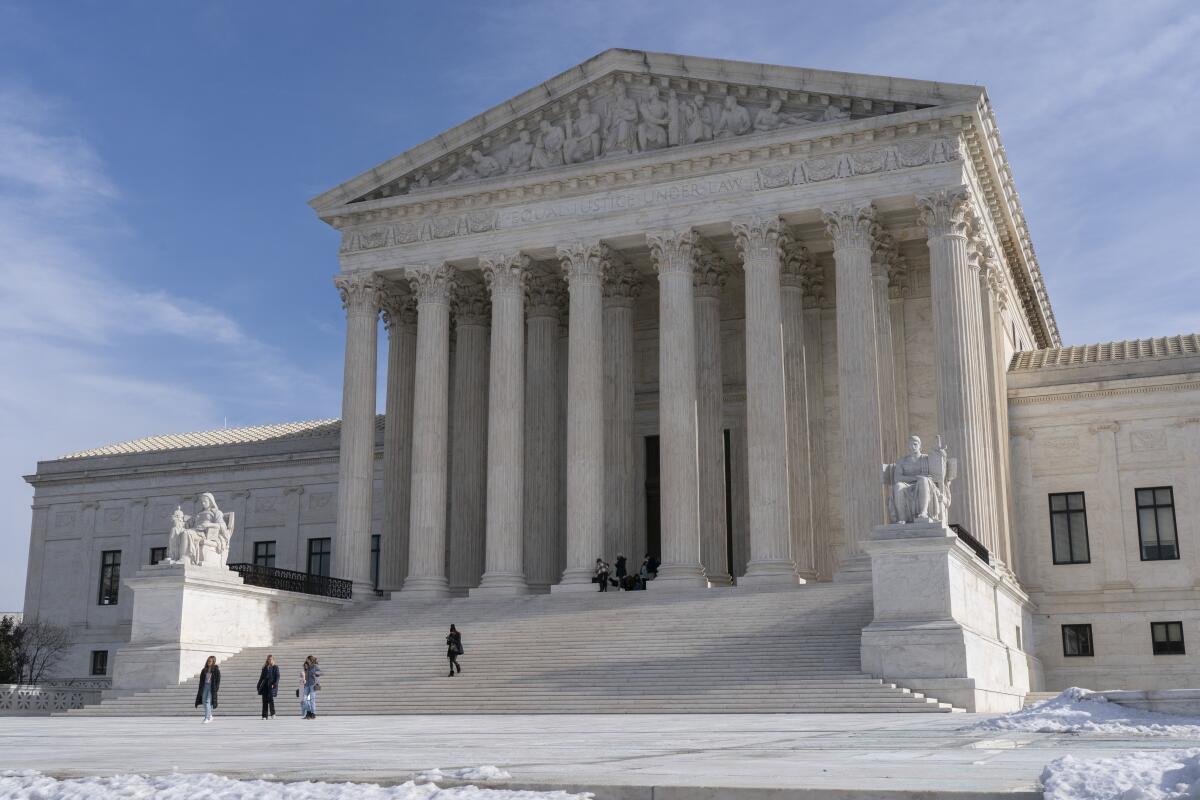Supreme Court dismisses challenges to Section 230, the legal shield that protects websites

WASHINGTON — The Supreme Court on Thursday dismissed a major challenge to the internet legal shield known as Section 230, which has long protected social media websites from being sued for what users post there.
In a short unsigned opinion, the court said it would not rule on the potentially momentous issue because the plaintiffs had no valid claims that Twitter or Google had aided terrorists, an allegation that was at the heart of their lawsuit.
The outcome came as relief for social media sites such as Facebook and YouTube that have grown and prospered due in large part to the protections set by Congress at the dawn of the internet.
“This is a huge win for free speech on the internet,” said Chris Marchese, Litigation Center director for the tech lobbying group NetChoice. “The court was asked to undermine Section 230 — and declined.”
But the justices left open the question that first drew their attention, so it could arise in a future case.
Section 230 has been dubbed “the 26 words that created the internet” because it said that “interactive computer service” can be a platform for free speech and shall not be “treated as the publisher or speaker of any information” posted there.
So while publishers and broadcasters can be sued for content they print or put on the air, interactive websites cannot.
In recent years, critics have complained that social media companies were pushing the limits of those protections with computer algorithms that steer users toward content that might be of interest to them, based on their past activity. At times, those algorithms direct users to content that could be deemed dangerous, violent or offensive.
Critics of Section 230 argued that even if companies are not held liable for what their users post, their algorithms’ suggestions to guide users to similar content are essentially the companies’ speech and should not be protected.
The Supreme Court had never ruled on Section 230, but last year it sent a shudder through much of the high-tech industry when it agreed to hear a pair of cases that challenged the legal immunity for websites.
The two lawsuits came from victims and survivors of terrorist attacks. In 2016, Congress made it easier to sue those who “aid or abet” an act of international terrorism by “knowingly” providing “substantial assistance” to the perpetrators.
In Twitter vs. Taamneh, the 9th Circuit Court of Appeals cleared the way for social media platforms including Facebook and Google to be sued on the grounds that their sites had helped recruit the terrorists who carried out a nightclub attack in Istanbul.
Meanwhile, in Gonzalez vs. Google, the court agreed to consider whether the platforms could be held liable — despite Section 230 — on the grounds that their algorithms had played a role in recruiting terrorists for a series of attacks in Paris.
In February, the justices heard arguments over two days in the two cases, starting with the focus on algorithms. During the second day, several justices voiced skepticism about the lawsuit in the case of the Istanbul attack.
On Thursday, they handed down a unanimous ruling dismissing the aiding and abetting lawsuit against Twitter. Justice Clarence Thomas said that such claims should be limited to “truly culpable conduct,” and that there was no convincing argument that Twitter had knowingly helped recruit terrorists.
Based on that conclusion, the justices also dismissed the companion case against Google that had raised the issue of algorithms, saying that since the underlying lawsuit cannot proceed, “we therefore decline to address the application of §230 to a complaint that appears to state little, if any, plausible claim for relief.”
Senate Judiciary Committee Chairman Richard J. Durbin (D-Ill.) said in a statement Thursday that the court’s nondecision should prompt Congress to change Section 230. Both Republicans and Democrats have been critical of the growing power and influence of Big Tech.
“The justices passed on their chance to clarify that Section 230 is not a get-out-of-jail-free card for online platforms when they cause harm,” Durbin said. “Enough is enough. ... Congress must step in, reform Section 230, and remove platforms’ blanket immunity from liability.”
More to Read
Get the L.A. Times Politics newsletter
Deeply reported insights into legislation, politics and policy from Sacramento, Washington and beyond. In your inbox three times per week.
You may occasionally receive promotional content from the Los Angeles Times.











